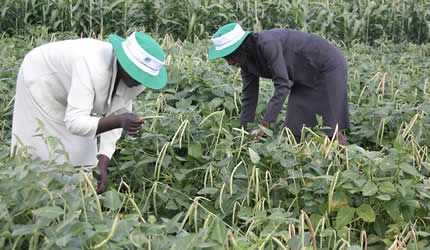
Agricultural extension workers inspect a thriving bean crop in Zimbabwe. The land reform program has won the admiration of many around the world., a photo by Pan-African News Wire File Photos on Flickr.
Land reform gets another thumbs-up, but . . .
Sunday, 05 January 2014 00:00
Harmony Agere In-Depth Reporter
Zimbabwe Sunday Mail
The land reform programme got yet another thumbs-up from an unlikely source following the publication of a report that stated that the agrarian reforms have transformed the lives of Zimbabwe’s rural populace.
The report, which was published at the end of last year by the Institute of Development Studies of the University of Sussex, indicates that the Zimbabwean economy is on the recovery that has been aided by the growth of rural businesses as a result of the land reform programme.
However, there are reports that the gains recorded so far could be swept away as some newly resettled farmers are alleging that they are being forced to leave their farms to pave way for other farmers, in cases that stink of corruption.
The study by Ian Scoones, a professor at the Institute of Development Studies at the University of Sussex, further suggests that the programme has significantly improved the agricultural sector.
According to Scoones, production initially collapsed in the early stages of the programme due to the challenges associated with the general state of the economy.
He, however, stated that the agricultural sector has been stable since 2009.
The report attributed the stabilisation to the increase in tobacco and cotton production.
The report states that “of around 7 million hectares of land redistributed via the land reform programme, 49,9 percent of the people who benefited were rural peasants, 18.3% were unemployed or in low-paid jobs in regional towns, growth points and mines, 16,5 percent were civil servants, and 6,7 percent were of the Zimbabwean working class.”
Contrary to the claims by critics of the land reform programme who are alleging that only Government bureaucrats were benefiting, the report indicates that only 4,8 percent of the land went to business people, and 3,7 percent went to security services.
Since the introduction of the land reform programme, farming activities have been on the increase in Zimbabwe with tobacco production leading the way.
A total of 153 million kilogrammes of tobacco were auctioned in the past season.
The successful land reform programme has managed to address a number of colonial injustices. To date, over 150 000 A1 and over 20 000 A2 farmers have benefited from the land redistribution exercise.
The Government in June 1998 published the policy framework on the land reform and resettlement programme Phase II.
The programme envisaged the compulsory purchase over five years of 50 000 square kilometres from the 112 000 square kilometres owned by white commercial farmers, public corporations, churches, non-governmental organisations and multi-national companies.
Broken down, the 50 000 square kilometres meant that every year between 1998 and 2003, the Government intended to acquire 10 000 square kilometres for redistribution.
By the beginning of the new millennium, Government moved swiftly to address the colonial ill by introducing an Act which removed the willing-buyer-willing-seller policy and replaced it with an Act which provided for compulsory acquisition of land by the Government for redistribution.
As a result of the Act, thousands of disenfranchised blacks who had been driven out of the fertile lands into “reserves” were allocated arable land.
However, despite recording many positives, the programme has been tainted by some greedy and corrupt elements who are slowing down the gains of the land reform programme.
There have been reports of corrupt land officials who are receiving bribes to corruptly allocate land in areas that have already been allocated to other farmers, causing strife and disunity in the process.
The illegal land allocations are alleged to have worsened after the 2013 harmonised elections.
Mrs Maurine Chindunda of Riversdale Farm in Chegutu said corruption is rife in her area.
“I am afraid that I might lose my farm anytime.
“I was allocated this farm 10 years ago, but last week, I was approached by some land officials who told me that I was supposed to move out and pave way for another farmer. I am, however, resisting that directive,” Mrs Chindunda said.
Another affected farmer, Jericho Mubai of Hurungwe, said he was forced to co-exist with another farmer.
In an interview, the Minister of Lands and Rural Resettlement, Cde Douglas Mombeshora, said his office had received numerous complaints about illegal land allocations and was looking into the matter. He said district administrators are not mandated to allocate land and warned those that are doing so that they will face the full wrath of the law.
“We have received reports about illegal land allocations and, as a ministry, we are going to put an end to that practice,” Minister Mombeshora said.
Senior Government officials have also castigated corrupt land dealings, saying such acts reverse the gains of the land reform programme.
Speaking at the recently held Zanu-PF Harare Provincial conference, Cde Amos Midzi, the chairman of the province, warned party members to desist from illegal land allocations.
“I would like to warn those that are illegally evicting and allocating land to stop doing so. As Government, we have proper structures that were established for those specific purposes,” he said.
No comments:
Post a Comment